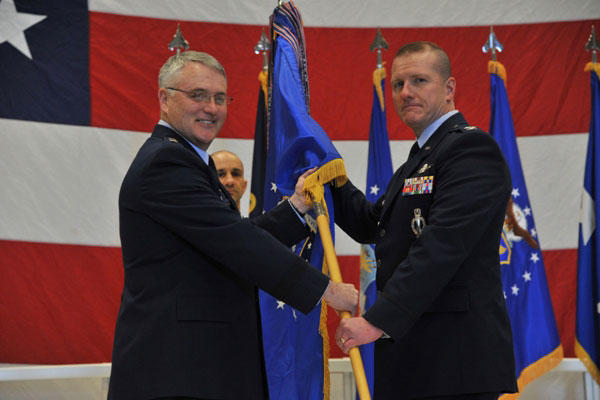The Air Force has fired nine mid-grade officers at a nuclear missile base in Montana and disciplined 79 junior grade officers following an investigation into a cheating scandal on monthly proficiency tests.
The commander of the 341st Missile Wing, Col. Robert Stanley, resigned the morning before Air Force Secretary Deborah James announced the punishments. He will retire, she said.
Air Force investigators said four missile officers in the 341st Missile Wing led a cheating ring that saw nearly 100 junior grade officers who cheated on monthly proficiency tests or knew of the cheating ring and didn't report it.
The cheating ring started in November 2011 and continued until November 2013 when agents with the Air Force Officer of Special Investigations discovered the cheating while investigating a separate drug case that included three of the four leaders of the ring. Agents found photos of classified test material on the cell phones, said Lt. Gen. Stephen Wilson, the head of Air Force Global Strike Command.
Missile officers who took the tests sent answers and questions from the test to other officers at the wing. James and Wilson said the cheating was a clear violation of Air Force core values.
The 341st Missile Wing at Malmstrom Air Force Base, Wyo., oversees 150 nuclear tipped intercontinental ballistic missiles. It is one of three such bases in the Air Force that fall under Global Strike Command. James said the mission of the wing was never compromised even though wide spread cheating occurred on the base for two years.
The junior grade officers involved will receive a variety of administrative and non-judicial punishments ranging from a letter of counseling to an Article 15 depending on the involvement within the cheating ring, Wilson said. Identities of all the officers involved were not released.
The nine mid-grade officers who were fired from leadership positions at the 341st Missile Wing, to include the three squadron commanders, did not take part in the cheating, but Wilson said the Air Force had lost faith in their leadership abilities. The officers made up the majority of the 341st Missile Wing's command structure and will be reassigned to other units, Wilson said.
Stanley offered his resignation when the cheating scandal was first discovered and he offered it again Thursday morning, Wilson said. It was accepted Thursday. Col. John Wilcox, Air Force Global Strike Command Security Forces Division director, will take over command of the 341st Missile Wing.
"I represent this wing to the world, and we let the American people down on my watch. With that realization, and the genuine hope that my action will stir even the most apathetic hearts to action, I have decided to volunteer my resignation from this post effective immediately," Stanley wrote in a message sent to 341st Missile Wing airmen upon his resignation.
The investigation into the cheating ring did not find evidence that the systemic level of cheating seen at the 341st Missile Wing occurred at the other two intercontinental ballistic missile bases in the Air Force. Wilson said the investigators "followed the evidence" from the cheating ring and asked missile officers at the two other wings if they knew of cheating occurring at their bases.
James said she has recognized "spotty morale" and leadership micromanagement during her visits to the Air Force's nuclear bases. Wilson also said the Air Force's missile officers felt an unnecessary level of stress to receive perfect test scores on every proficiency test. He said the pressure was a factor that led officers to feel like they had to cheat to meet those expectations.
"Leaders lost track that execution in the field is more important than what happens in a classroom," Wilson said. "[The missile officers] felt compelled to cheat to get a perfect score."
In order to address problems within the service's nuclear enterprise, James introduced a force improvement program to address leadership development, re-invigorate the missile officer career field, and improve missile facilities.
"We say this is an important mission but do we in fact put enough money where our mouth is when it comes to resource decisions? And do the missileers have career paths and adequate mentorship and leadership training commensurate with the importance of this mission?" James said.
This year the Air Force will spend $19 million to refurbish launch control facilities and make infrastructure repairs. The 20th Air Force will spend another $3 million to improve "quality of life requirements," James said.
Next year, the spending will rise dramatically. About $455 million will be spent to sustain Minuteman squadrons, ICBM helicopter support and communications areas, James said. Another $154 million will be spent to make readiness and training improvements to launch control facilities, she said.
Global Strike Command officials will also form what are called quick look action teams that will develop recommendations to improve morale within the missile officer career field to include incentives and accolades, James said. The teams will issue their reports next month.
"We're not just putting a fresh coat of paint on these issues," Wilson said.
However, this is the second time the Air Force has had to announce large scale firings and whole sale changes within its nuclear mission in the past six years. In 2008, the Air Force Secretary and Chief of Staff were fired after six nuclear warheads were mistakenly shipped across country, and in a separate incident nuclear warhead components were wrongly shipped to Taiwan. Six years later a cheating scandal was discovered that included a significant chunk of the officers entrusted to launch ICBMs.
When asked by Military.com why the Air Force has waited for problems to make changes rather than act proactively, neither Wilson nor James had an answer. Wilson only offered more comments on the pressure the missile officers felt to receive perfect test scores on their proficiency tests.
"If one person had spoken up, this could have been very different," James said. "That's why we're focusing on what integrity means."
The Air Force also announced the firing of Col. Donald Holloway who was serving as commander of the 90th Operations Group at the base. Col. Tracey Hayes, commander of the 90th Missile Wing, cited a "loss of confidence" in Holloway's ability to lead. Hayes said Holloway's departure has nothing to do with the cheating scandal.
The Associated Press contributed to this article.
-- Michael Hoffman can be reached at mike.hoffman@monster.com
























